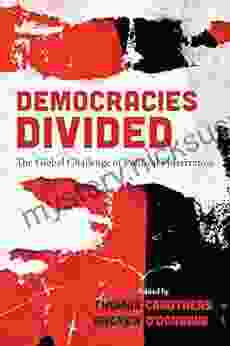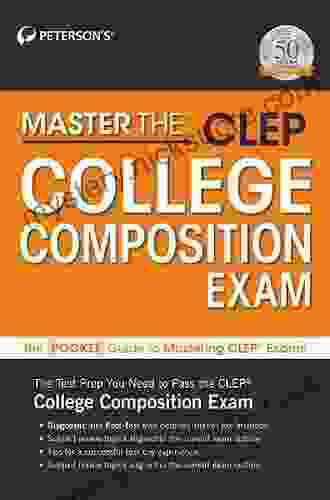Democracies Divided: The Global Challenge of Political Polarization

Political polarization is a growing problem in democracies around the world. It is characterized by a deep divide between two or more groups of people, who have very different political views and values. This divide can lead to gridlock in government, social unrest, and even violence.
4.1 out of 5
| Language | : | English |
| File size | : | 5523 KB |
| Text-to-Speech | : | Enabled |
| Screen Reader | : | Supported |
| Enhanced typesetting | : | Enabled |
| Word Wise | : | Enabled |
| Print length | : | 305 pages |
There are many factors that have contributed to the rise of political polarization. These include:
- Economic inequality: The gap between the rich and the poor has been growing in many countries, and this has led to resentment and anger among those who feel that they are not getting their fair share.
- Social media: Social media has made it easier for people to connect with others who share their views, and this has led to the creation of echo chambers, where people are only exposed to information that confirms their existing beliefs.
- Filter bubbles: Filter bubbles are algorithms that personalize the content that people see on social media. These algorithms can lead to people being exposed to a narrow range of views, which can further contribute to polarization.
- Fake news: Fake news is false or misleading information that is spread through social media and other channels. Fake news can be used to spread propaganda and to divide people.
- Gerrymandering: Gerrymandering is the practice of drawing electoral districts in a way that gives one party an unfair advantage. This can lead to the election of more extreme candidates, who are more likely to contribute to polarization.
- Redistricting: Redistricting is the process of redrawing electoral districts. This process can be used to gerrymander districts, or it can be used to create more competitive districts, which can help to reduce polarization.
- Voting rights: Restrictions on voting rights can make it harder for certain groups of people to participate in the political process. This can lead to the election of candidates who do not represent the interests of all citizens.
- Campaign finance: The way that campaigns are financed can have a significant impact on polarization. Large donations from special interests can give some candidates an unfair advantage, and this can lead to the election of candidates who are beholden to those interests.
- Media bias: Media bias can occur when news organizations favor one political party or ideology over another. This can lead to the spread of misinformation and propaganda, and it can further contribute to polarization.
- Partisanship: Partisanship is the tendency to support one political party over another. This can lead to people seeing the other party as the enemy, and it can make it difficult to find common ground.
- Tribalism: Tribalism is the tendency to identify with a particular group of people, and to see other groups as outsiders. This can lead to conflict and violence.
- Identity politics: Identity politics is the practice of basing political decisions on the interests of a particular group of people, such as race, gender, or sexual orientation. This can lead to the exclusion of other groups, and it can further contribute to polarization.
- Globalization: Globalization has led to increased economic interdependence, but it has also led to increased cultural and political diversity. This can lead to tensions between different groups of people, and it can further contribute to polarization.
- Technology: Technology has made it easier for people to connect with others, but it has also made it easier for people to spread misinformation and propaganda. This can further contribute to polarization.
- Populism: Populism is a political ideology that appeals to the common people. Populist politicians often use scapegoats and fear-mongering to gain support. This can further contribute to polarization.
- Nationalism: Nationalism is a political ideology that emphasizes the importance of national identity. Nationalist politicians often use xenophobia and isolationism to gain support. This can further contribute to polarization.
- Authoritarianism: Authoritarianism is a political system in which one person or a small group of people has absolute power. Authoritarian governments often use repression and violence to maintain control. This can further contribute to polarization.
Political polarization is a serious problem that has the potential to undermine democracy. It can lead to gridlock in government, social unrest, and even violence. There are many factors that have contributed to the rise of polarization, and it is likely to continue to be a challenge for democracies in the years to come.
There are a number of things that can be done to address political polarization. These include:
- Reduce economic inequality: Reducing economic inequality can help to address the resentment and anger that is often associated with polarization.
- Promote media literacy: Media literacy is the ability to evaluate the accuracy and reliability of information. This can help people to avoid being misled by fake news and propaganda.
- Reform campaign finance: Reforming campaign finance can help to reduce the influence of special interests and to give all candidates a more equal chance of winning.
- Promote voting rights: Expanding voting rights can help to ensure that all citizens have a voice in the political process.
- Encourage dialogue and compromise: It is important to encourage dialogue and compromise between different groups of people. This can help to build bridges and to find common ground.
- Promote education: Education is essential for a healthy democracy. It can help people to understand different perspectives and to develop critical thinking skills.
- Support civil society organizations: Civil society organizations play an important role in promoting dialogue and compromise. They can also help to hold governments accountable.
Political polarization is a complex problem, but it is one that can be solved. By working together, we can create a more just and equitable world for everyone.
4.1 out of 5
| Language | : | English |
| File size | : | 5523 KB |
| Text-to-Speech | : | Enabled |
| Screen Reader | : | Supported |
| Enhanced typesetting | : | Enabled |
| Word Wise | : | Enabled |
| Print length | : | 305 pages |
Do you want to contribute by writing guest posts on this blog?
Please contact us and send us a resume of previous articles that you have written.
 Fiction
Fiction Non Fiction
Non Fiction Romance
Romance Mystery
Mystery Thriller
Thriller SciFi
SciFi Fantasy
Fantasy Horror
Horror Biography
Biography Selfhelp
Selfhelp Business
Business History
History Classics
Classics Poetry
Poetry Childrens
Childrens Young Adult
Young Adult Educational
Educational Cooking
Cooking Travel
Travel Lifestyle
Lifestyle Spirituality
Spirituality Health
Health Fitness
Fitness Technology
Technology Science
Science Arts
Arts Crafts
Crafts DIY
DIY Gardening
Gardening Petcare
Petcare Peter J D Adamo
Peter J D Adamo Helen Zuman
Helen Zuman Graham Hancock
Graham Hancock W D Wetherell
W D Wetherell Nikki Carroll
Nikki Carroll Lily Field
Lily Field Dan Flores
Dan Flores Thomas Daniels
Thomas Daniels Jane Brocket
Jane Brocket Steve Guest
Steve Guest Cal Newport
Cal Newport Sarah Jacoby
Sarah Jacoby George Daniel
George Daniel Vincent Chidindu Asogwa
Vincent Chidindu Asogwa Mike X Cohen
Mike X Cohen Dounya Awada
Dounya Awada Joanne Kimes
Joanne Kimes Chris Pountney
Chris Pountney Shawna Richer
Shawna Richer Oliver Sacks
Oliver Sacks David Wilber
David Wilber Sammy Franco
Sammy Franco Katharine Mcgee
Katharine Mcgee Denise May Levenick
Denise May Levenick Clement Salvadori
Clement Salvadori Maurice J Thompson
Maurice J Thompson Sarah Baker
Sarah Baker Mary C Townsend
Mary C Townsend Natasha Ngan
Natasha Ngan Jennifer L Scott
Jennifer L Scott Emt Basic Exam Prep Team
Emt Basic Exam Prep Team William Wood
William Wood Michael Lear Hynson
Michael Lear Hynson Brandy Colbert
Brandy Colbert Della Ata Khoury
Della Ata Khoury Henry Malone
Henry Malone Ron Senyor
Ron Senyor Robert Moor
Robert Moor Niels H Lauersen
Niels H Lauersen Cameron Mcwhirter
Cameron Mcwhirter John J Ratey
John J Ratey John M Marzluff
John M Marzluff Charles Staley
Charles Staley Pam Flowers
Pam Flowers Francis Glebas
Francis Glebas J R Harris
J R Harris Lily Raff Mccaulou
Lily Raff Mccaulou Phil Bourque
Phil Bourque Steve Barrett
Steve Barrett Justin Coulson
Justin Coulson Max Lucado
Max Lucado Joanne V Hickey
Joanne V Hickey Richard Drake
Richard Drake Law School Admission Council
Law School Admission Council Lucy Cooke
Lucy Cooke Meghan Daum
Meghan Daum Melissa Mullamphy
Melissa Mullamphy Upton Sinclair
Upton Sinclair Marco Wenisch
Marco Wenisch Lisa Feldman Barrett
Lisa Feldman Barrett Elena Paige
Elena Paige Dennis Adler
Dennis Adler Chad Eastham
Chad Eastham Bruce Maxwell
Bruce Maxwell Richard Bullivant
Richard Bullivant Erin Beaty
Erin Beaty Craig Callender
Craig Callender Ivan Gridin
Ivan Gridin Hugh Aldersey Williams
Hugh Aldersey Williams Freya Pickard
Freya Pickard Ian Tuhovsky
Ian Tuhovsky James Miller
James Miller Kevin A Morrison
Kevin A Morrison Konstantinos Mylonas
Konstantinos Mylonas Kat Davis
Kat Davis Emily Lowry
Emily Lowry S M Kingdom
S M Kingdom Warwick Deeping
Warwick Deeping Matt Mullenix
Matt Mullenix Karen J Rooney
Karen J Rooney Susan Frederick Gray
Susan Frederick Gray The Atavist
The Atavist Steven Kerry Brown
Steven Kerry Brown Fern Schumer Chapman
Fern Schumer Chapman Ivy Hope
Ivy Hope Bruce W Harris
Bruce W Harris John H Cunningham
John H Cunningham Douglas P Fry
Douglas P Fry Ken Sande
Ken Sande Julia Ann Clayton
Julia Ann Clayton John Jamieson
John Jamieson Joyceen S Boyle
Joyceen S Boyle Jack Canfield
Jack Canfield Michael Mewshaw
Michael Mewshaw Michael A Tompkins
Michael A Tompkins Elizabeth Laing Thompson
Elizabeth Laing Thompson Frank Muir
Frank Muir Trevelyan
Trevelyan Troy Horne
Troy Horne Sarah Prager
Sarah Prager Scott Mactavish
Scott Mactavish Robert D Gibbons
Robert D Gibbons Jimmy Chin
Jimmy Chin Matthew Marchon
Matthew Marchon Pia Nilsson
Pia Nilsson Bruce Van Brunt
Bruce Van Brunt Mathew Orton
Mathew Orton Albert Rutherford
Albert Rutherford Hibiki Yamazaki
Hibiki Yamazaki Jeff Belanger
Jeff Belanger Tibor Rutar
Tibor Rutar Tim Freke
Tim Freke Hecateus Apuliensis
Hecateus Apuliensis Mark Stanton
Mark Stanton Simon Michael Prior
Simon Michael Prior Luc Mehl
Luc Mehl Earl G Williams
Earl G Williams Wyatt Mcspadden
Wyatt Mcspadden Elizabeth May
Elizabeth May Anthony Camera
Anthony Camera Jim Supica
Jim Supica Rowena Bennett
Rowena Bennett Shelby Hailstone Law
Shelby Hailstone Law Pedro Urvi
Pedro Urvi Carrie Hope Fletcher
Carrie Hope Fletcher Maria Van Noord
Maria Van Noord Kevin Howell
Kevin Howell Carmen Davenport
Carmen Davenport Donna Goldberg
Donna Goldberg Judith Merkle Riley
Judith Merkle Riley Meg Cabot
Meg Cabot Michael D Alessio
Michael D Alessio Healthfit Publishing
Healthfit Publishing Peter Bodo
Peter Bodo Cassandra Mack
Cassandra Mack Cornelia Pelzer Elwood
Cornelia Pelzer Elwood Ruthellen Josselson
Ruthellen Josselson Thomas Deetjen
Thomas Deetjen Narain Moorjani
Narain Moorjani John Kretschmer
John Kretschmer Stedman Graham
Stedman Graham James Beard
James Beard William Ellet
William Ellet Matt Baglio
Matt Baglio Sonia Shah
Sonia Shah Bryan Litz
Bryan Litz Ralph Galeano
Ralph Galeano Graham Norton
Graham Norton Gary Mayes
Gary Mayes Db King
Db King Collins Easy Learning
Collins Easy Learning Steven W Dulan
Steven W Dulan Megan Miller
Megan Miller Charu C Aggarwal
Charu C Aggarwal Jamie Marich
Jamie Marich Joe Baker
Joe Baker Martin Davies
Martin Davies Tyler Burt
Tyler Burt Nicola S Dorrington
Nicola S Dorrington Robert Edward Grant
Robert Edward Grant Lingo Mastery
Lingo Mastery Leslie A Sams
Leslie A Sams Scott Cawthon
Scott Cawthon Daniel Prince
Daniel Prince Tim Glover
Tim Glover Dina Nayeri
Dina Nayeri Bryce Carlson
Bryce Carlson Sherri L Jackson
Sherri L Jackson Stian Christophersen
Stian Christophersen Stella Cottrell
Stella Cottrell Robert Garland
Robert Garland Kevin Houston
Kevin Houston Dory Willer
Dory Willer Nicola Yoon
Nicola Yoon Ashley Eckstein
Ashley Eckstein Laurie Notaro
Laurie Notaro Philip Purser Hallard
Philip Purser Hallard David Nathan Fuller
David Nathan Fuller Sarah Ockwell Smith
Sarah Ockwell Smith Lewis Kirkham
Lewis Kirkham Thomas Carothers
Thomas Carothers Olivier Doleuze
Olivier Doleuze Katie Fallon
Katie Fallon Duncan Steel
Duncan Steel Shea Ernshaw
Shea Ernshaw Paul Rabinow
Paul Rabinow Christine Mari Inzer
Christine Mari Inzer Lianna Marie
Lianna Marie Om Krishna Uprety
Om Krishna Uprety Romola Anderson
Romola Anderson Stephen Harrison
Stephen Harrison Phil Williams
Phil Williams Rick Trickett
Rick Trickett Wilhelm Reich
Wilhelm Reich Michael Blastland
Michael Blastland Sheila A Sorrentino
Sheila A Sorrentino Lsat Unplugged
Lsat Unplugged David Tanis
David Tanis Carole Bouchard
Carole Bouchard Charles Sanger
Charles Sanger Arrl Inc
Arrl Inc Pat Rigsby
Pat Rigsby Sarah Berman
Sarah Berman Frederick Jackson Turner
Frederick Jackson Turner Susan Garcia
Susan Garcia Dave Rearick
Dave Rearick Gary Lewis
Gary Lewis Simon A Rego
Simon A Rego Jim Wiese
Jim Wiese David Martin
David Martin Jessica Howard
Jessica Howard Rita Golden Gelman
Rita Golden Gelman Sylvia Williams Dabney
Sylvia Williams Dabney Zachery Knowles
Zachery Knowles Rebecca Musser
Rebecca Musser Neville Goddard
Neville Goddard Nicolas Bergeron
Nicolas Bergeron Julie Golob
Julie Golob Deirdre V Lovecky
Deirdre V Lovecky Michelle Travis
Michelle Travis Albert Jeremiah Beveridge
Albert Jeremiah Beveridge Lynette Noni
Lynette Noni Kyra Phillips
Kyra Phillips Fiona Beddall
Fiona Beddall Mark Young
Mark Young Mark Stavish
Mark Stavish Barbara Acello
Barbara Acello Chris Morton
Chris Morton Sara Gaviria
Sara Gaviria M E Brines
M E Brines Dave Bosanko
Dave Bosanko Dan Romanchik Kb6nu
Dan Romanchik Kb6nu Elizabeth Anne Wood
Elizabeth Anne Wood Sterling Test Prep
Sterling Test Prep E W Barton Wright
E W Barton Wright Dr Tommy John
Dr Tommy John Sheri Morehouse
Sheri Morehouse Tony E Adams
Tony E Adams Diane Lindsey Reeves
Diane Lindsey Reeves Scarlett V Clark
Scarlett V Clark Aaron Reed
Aaron Reed Issai Chozanshi
Issai Chozanshi William Rathje
William Rathje Peterson S
Peterson S John Vince
John Vince Helen Webster
Helen Webster John R Mabry
John R Mabry Jacob Erez
Jacob Erez Lina K Lapina
Lina K Lapina Kacen Callender
Kacen Callender Roger Marshall
Roger Marshall Kevin Panetta
Kevin Panetta Rob Pate
Rob Pate Guy Grieve
Guy Grieve Marc Van Den Bergh
Marc Van Den Bergh Julietta Suzuki
Julietta Suzuki Martina Mcbride
Martina Mcbride Tricia Levenseller
Tricia Levenseller Norman Thelwell
Norman Thelwell Leah Hazard
Leah Hazard Matt Racine
Matt Racine Buddy Levy
Buddy Levy Shmuel Goldberg
Shmuel Goldberg Sallyann Beresford
Sallyann Beresford Max Prasac
Max Prasac Valerie Poore
Valerie Poore Doug Cook
Doug Cook Elizabeth Dupart
Elizabeth Dupart John Grehan
John Grehan Maxine A Goldman
Maxine A Goldman Veronica Roth
Veronica Roth Martha Finley
Martha Finley Jim Al Khalili
Jim Al Khalili Dr Monika Chopra
Dr Monika Chopra Veronica Eden
Veronica Eden Richard W Voelz
Richard W Voelz Mona Bijjani
Mona Bijjani Celeste Headlee
Celeste Headlee Bunmi Laditan
Bunmi Laditan Cecil B Hartley
Cecil B Hartley Eric P Lane
Eric P Lane Matthew Warner Osborn
Matthew Warner Osborn Ira K Wolf
Ira K Wolf Jonathan T Gilliam
Jonathan T Gilliam Robert Larrison
Robert Larrison Ken Schwaber
Ken Schwaber Jen Howver
Jen Howver Dian Olson Belanger
Dian Olson Belanger Wayne Coffey
Wayne Coffey David Eagleman
David Eagleman Darcy Lever
Darcy Lever Bruce Watt
Bruce Watt Terry Laughlin
Terry Laughlin Eugenia G Kelman
Eugenia G Kelman Orangepen Publications
Orangepen Publications Robert A Cutietta
Robert A Cutietta Paul Lobo
Paul Lobo Vladimir Lossky
Vladimir Lossky Kathleen Flinn
Kathleen Flinn Sue Elvis
Sue Elvis Vivian Foster
Vivian Foster Eric R Dodge
Eric R Dodge Max Lugavere
Max Lugavere Mcgraw Hill
Mcgraw Hill Ronit Irshai
Ronit Irshai C J Archer
C J Archer Nigel Cawthorne
Nigel Cawthorne Chris Bonington
Chris Bonington Mark Hansen
Mark Hansen Kruti Joshi
Kruti Joshi John Moren
John Moren Elaine Tyler May
Elaine Tyler May James W Anderson
James W Anderson Linda Rosenkrantz
Linda Rosenkrantz Ivar Dedekam
Ivar Dedekam Jennifer Rose
Jennifer Rose Paul Murdin
Paul Murdin Jesse Romero
Jesse Romero Joel Best
Joel Best Michael Chatfield
Michael Chatfield Malika Grayson
Malika Grayson Michael Gurian
Michael Gurian Shyima Hall
Shyima Hall Nicholas Tomalin
Nicholas Tomalin Natasha Daniels
Natasha Daniels Dvora Meyers
Dvora Meyers Lottie Bildirici
Lottie Bildirici Elmer Keith
Elmer Keith Samantha De Senna Fernandes
Samantha De Senna Fernandes K C Cole
K C Cole Thomas Achatz
Thomas Achatz Nedu
Nedu Dorothy Canfield Fisher
Dorothy Canfield Fisher C S Lewis
C S Lewis Melissa A Priblo Chapman
Melissa A Priblo Chapman Dianne Maroney
Dianne Maroney William M Baum
William M Baum Ian Leslie
Ian Leslie Sophie Messager
Sophie Messager Tom Bass
Tom Bass Meriwether Lewis
Meriwether Lewis Tanya Hackney
Tanya Hackney Suzanne Young
Suzanne Young Ransom Riggs
Ransom Riggs Jack Disbrow Gunther
Jack Disbrow Gunther Ed Housewright
Ed Housewright John H Falk
John H Falk Jeff Scheetz
Jeff Scheetz Larry Larsen
Larry Larsen Declan Lyons
Declan Lyons Ron Rapoport
Ron Rapoport Jess J James
Jess J James Jeffrey L Kohanek
Jeffrey L Kohanek Douglas Preston
Douglas Preston Elisabeth Elliot
Elisabeth Elliot C F Crist
C F Crist Stephen King
Stephen King Don S Lemons
Don S Lemons Jim Kempton
Jim Kempton Scott Mcmillion
Scott Mcmillion Jill Angie
Jill Angie Richard Barrett
Richard Barrett Greg W Prince
Greg W Prince Leslie R Schover
Leslie R Schover J D Williams
J D Williams Jessica Holsman
Jessica Holsman Kindle Edition
Kindle Edition Paul A Offit
Paul A Offit Winslow Tudor
Winslow Tudor Joseph Moss
Joseph Moss Leah Zani
Leah Zani Mary Pagones
Mary Pagones David Savedge
David Savedge Maren Stoffels
Maren Stoffels L W Jacobs
L W Jacobs Melanie Anne Phillips
Melanie Anne Phillips Bruce Sutherland
Bruce Sutherland Don Allen Jr
Don Allen Jr Tamara Ferguson
Tamara Ferguson Scott Hartshorn
Scott Hartshorn Trevor Thomas
Trevor Thomas Joseph Correa
Joseph Correa Howard E Mccurdy
Howard E Mccurdy Lynn Butler Kisber
Lynn Butler Kisber Kerry H Cheever
Kerry H Cheever Ashley Christensen
Ashley Christensen Ronald T Potter Efron
Ronald T Potter Efron Nick Gamis
Nick Gamis Victoria Honeybourne
Victoria Honeybourne Marla Taviano
Marla Taviano Sophie D Coe
Sophie D Coe Matt Price
Matt Price J R Rain
J R Rain Tim S Grover
Tim S Grover Lois Lowry
Lois Lowry Lew Freedman
Lew Freedman Dick Hannula
Dick Hannula David Cannon
David Cannon Caroline Manta
Caroline Manta Lauren Manoy
Lauren Manoy Maha Alkurdi
Maha Alkurdi R L Medina
R L Medina Keith Brewer
Keith Brewer Philippe Karl
Philippe Karl Shaunti Feldhahn
Shaunti Feldhahn Richard Henry Dana
Richard Henry Dana Carrie Marie Bratley
Carrie Marie Bratley Marc Bona
Marc Bona Edward Humes
Edward Humes Oprah Winfrey
Oprah Winfrey Carol Inskipp
Carol Inskipp Valliappa Lakshmanan
Valliappa Lakshmanan Emma Warren
Emma Warren Sam Priestley
Sam Priestley Craig Martelle
Craig Martelle Jennifer Appel
Jennifer Appel Tyler Trent
Tyler Trent Caleb J Tzilkowski
Caleb J Tzilkowski Janet Evans
Janet Evans Michael Tan
Michael Tan Byron L Reeder
Byron L Reeder R Scott Thornton
R Scott Thornton Marcia Scheiner
Marcia Scheiner Jasmine Shao
Jasmine Shao Susan Orlean
Susan Orlean Kaplan Test Prep
Kaplan Test Prep Tina Schindler
Tina Schindler Gregory A Kompes
Gregory A Kompes Paige Powers
Paige Powers Fmg Publications Special Edition
Fmg Publications Special Edition Kendall Rose
Kendall Rose Ned Feehally
Ned Feehally Skip Lockwood
Skip Lockwood Martina D Antiochia
Martina D Antiochia Jim West
Jim West Tom Cunliffe
Tom Cunliffe Heather Balogh Rochfort
Heather Balogh Rochfort Silvia Dunn
Silvia Dunn Nick Tumminello
Nick Tumminello Tey Meadow
Tey Meadow Robert Walker
Robert Walker Jared Diamond
Jared Diamond Kelly Rowland
Kelly Rowland Heather Jacobson
Heather Jacobson Lee Jackson
Lee Jackson Richard C Francis
Richard C Francis William Ian Miller
William Ian Miller Erin Macy
Erin Macy Charles Salzberg
Charles Salzberg Katherine D Kinzler
Katherine D Kinzler Roger J Davies
Roger J Davies Lee Alan Dugatkin
Lee Alan Dugatkin Mo Gawdat
Mo Gawdat J Maarten Troost
J Maarten Troost Richard Harding Davis
Richard Harding Davis Theodora Papatheodorou
Theodora Papatheodorou Sandra Niche
Sandra Niche Jason Runkel Sperling
Jason Runkel Sperling Leon Speroff
Leon Speroff Carlos I Calle
Carlos I Calle Nick Littlehales
Nick Littlehales John Burroughs
John Burroughs Donna R Causey
Donna R Causey William L Sullivan
William L Sullivan Stacey Rourke
Stacey Rourke Huberta Wiertsema
Huberta Wiertsema Nawuth Keat
Nawuth Keat Rand Cardwell
Rand Cardwell Destiny S Harris
Destiny S Harris Jim Warnock
Jim Warnock Caitlyn Dare
Caitlyn Dare Creek Stewart
Creek Stewart Kathy Woods
Kathy Woods Marisa Peer
Marisa Peer Pamela Weintraub
Pamela Weintraub John Flanagan
John Flanagan Cathy Glass
Cathy Glass Lisa Hopp
Lisa Hopp C M Carney
C M Carney Winky Lewis
Winky Lewis E Ink Utilizer
E Ink Utilizer Emily Writes
Emily Writes James Goi Jr
James Goi Jr
Light bulbAdvertise smarter! Our strategic ad space ensures maximum exposure. Reserve your spot today!

 Bryan GrayThe Official LSAT Preptest 76: A Comprehensive Guide to Law School Admissions...
Bryan GrayThe Official LSAT Preptest 76: A Comprehensive Guide to Law School Admissions... Norman ButlerFollow ·12.7k
Norman ButlerFollow ·12.7k Eugene PowellFollow ·13.6k
Eugene PowellFollow ·13.6k Matthew WardFollow ·14.6k
Matthew WardFollow ·14.6k Albert ReedFollow ·16.4k
Albert ReedFollow ·16.4k Alfred RossFollow ·6.7k
Alfred RossFollow ·6.7k Jordan BlairFollow ·9.6k
Jordan BlairFollow ·9.6k John UpdikeFollow ·12.9k
John UpdikeFollow ·12.9k George MartinFollow ·15.5k
George MartinFollow ·15.5k

 Henry David Thoreau
Henry David ThoreauHow To Bake In Unique Way: Unleash Your Culinary...
Baking is an art form that transcends the...

 F. Scott Fitzgerald
F. Scott FitzgeraldAcademic Magic: Unveil the Secrets of The Last Magus
Delve into a Realm of...

 John Green
John GreenThe Digitally Agile Researcher in UK Higher Education:...
In the rapidly...

 George Orwell
George OrwellZinc: Sources And Significance To Human Health
Zinc, an essential trace mineral, plays a...

 Mario Simmons
Mario SimmonsToo Scared to Tell: A Harrowing and Thought-Provoking...
In the realm...
4.1 out of 5
| Language | : | English |
| File size | : | 5523 KB |
| Text-to-Speech | : | Enabled |
| Screen Reader | : | Supported |
| Enhanced typesetting | : | Enabled |
| Word Wise | : | Enabled |
| Print length | : | 305 pages |












